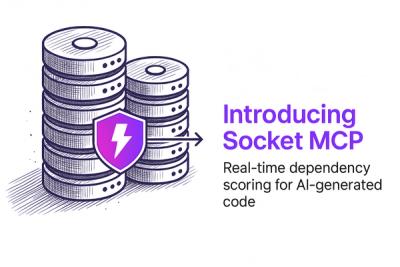
Product
Secure Your AI-Generated Code with Socket MCP
Socket MCP brings real-time security checks to AI-generated code, helping developers catch risky dependencies before they enter the codebase.
This module provides execution locals aka "xlocal" objects which implement a more restricted variant of "thread locals". An execution local allows to manage attributes on a per-execution basis in a manner similar to how real locals work:
Attribute bindings for an xlocal objects will not leak outside a context-managed code block and they will not leak to other threads of greenlets. By contrast, both process-globals and so called "thread locals" do not implement the above properties.
Let's look at a basic example::
# content of example.py
from xlocal import xlocal
xcurrent = xlocal()
def output():
print "hello world", xcurrent.x
if __name__ == "__main__":
with xcurrent(x=1):
output()
If we execute this module, the output() function will see
a xcurrent.x==1 binding::
$ python example.py
hello world 1
Here is what happens in detail: xcurrent(x=1) returns a context manager which
sets/resets the x attribute on the xcurrent object. While remaining
in the same thread/greenlet, all code triggered by the with-body (in this case
just the output() function) can access xcurrent.x. Outside the with-
body xcurrent.x would raise an AttributeError. It is also not allowed
to directly set xcurrent attributes; you always have to explicitely mark their
life-cycle with a with-statement. This means that invoked code:
Another module may now reuse the example code::
# content of example_call.py
import example
with example.xcurrent(x=3):
example.output()
which when running ...::
$ python example_call.py
hello world 3
will cause the example.output() function to print the xcurrent.x binding
as defined at the invoking with xcurrent(x=3) statement.
Other threads or greenlets will never see this xcurrent.x binding; they may even
set and read their own distincit xcurrent.x object. This means that all
threads/greenlets can concurrently call into a function which will always
see the execution specific x attribute.
When invoking plugin code or handler code to perform work, you may not want to pass around all state that might ever be needed. Instead of using a global or thread local you can safely pass around such state in execution locals. Here is a pseudo example::
xcurrent = xlocal()
def with_xlocal(func, **kwargs):
with xcurrent(**kwargs):
func()
def handle_request(request):
func = gethandler(request) # some user code
spawn(with_xlocal(func, request=request))
handle_request will run a user-provided handler function in a newly
spawned execution unit (for example spawn might map to
threading.Thread(...).start() or to gevent.spawn(...)). The
generic with_xlocal helper wraps the execution of the handler
function so that it will see a xcurrent.request binding. Multiple
spawns may execute concurrently and xcurrent.request will
carry the execution-specific request object in each of them.
If a method memorizes an attribute of an execution local, for
example the above xcurrent.request, then it will keep a reference to
the exact request object, not the per-execution one. If you want to
keep a per-execution local, you can do it this way for example::
Class Renderer:
@property
def request(self):
return xcurrent.request
this means that Renderer instances will have an execution-local
self.request object even if the life-cycle of the instance crosses
execution units.
Another issue is that if you spawn new execution units, they will not implicitely inherit execution locals. Instead you have to wrap your spawning function to explicitely set execution locals, similar to what we did in the above "invoking handlers" section.
This code is based on discussions with Armin Ronacher and others
in response to a tweet of mine <https://twitter.com/hpk42/status/268012251888353280>_. It extracts and refines some ideas found in Armin's "werzeug.local" module
and friends.
:copyright: (c) 2012 by Holger Krekel, partially Armin Ronacher :license: BSD, see LICENSE for more details.
FAQs
execution locals: killing global state (including thread locals)
We found that xlocal demonstrated a healthy version release cadence and project activity because the last version was released less than a year ago. It has 1 open source maintainer collaborating on the project.
Did you know?

Socket for GitHub automatically highlights issues in each pull request and monitors the health of all your open source dependencies. Discover the contents of your packages and block harmful activity before you install or update your dependencies.

Product
Socket MCP brings real-time security checks to AI-generated code, helping developers catch risky dependencies before they enter the codebase.

Security News
As vulnerability data bottlenecks grow, the federal government is formally investigating NIST’s handling of the National Vulnerability Database.

Research
Security News
Socket’s Threat Research Team has uncovered 60 npm packages using post-install scripts to silently exfiltrate hostnames, IP addresses, DNS servers, and user directories to a Discord-controlled endpoint.